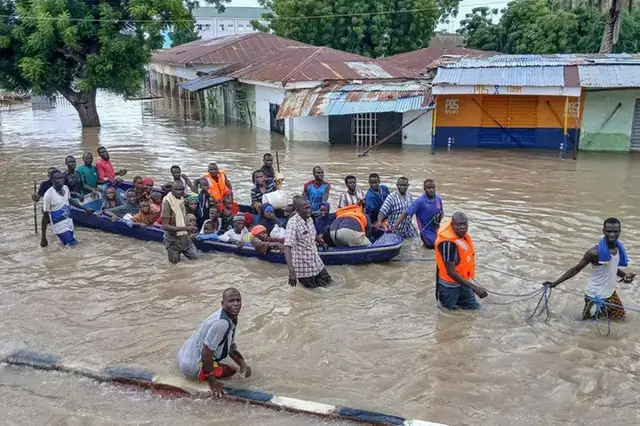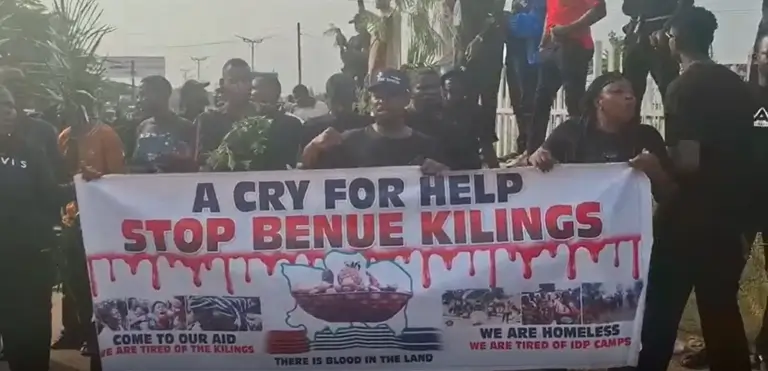Catastrophic Flooding in Mokwa
(May 29 onwards; reported early June 2025)
Between late May and early June 2025, torrential rains unleashed the worst flooding Mokwa, in Niger State, has seen in six decades, with waters rising suddenly from May 29 and sweeping through the districts of Tiffin Maza and Anguwan Hausawa. Local authorities report that over 200 people lost their lives in the deluge, while another 500 are still missing and presumed dead after search efforts were called off amid fears that no more survivors would be found [1]. The flooding submerged more than 3,000 homes, destroyed two major bridges and washed away critical sections of roadway, effectively isolating flooded communities and hampering rescue operations [1] [2].
An estimated 3,000 households, roughly 15,000 individuals, were forced to flee their homes, setting up makeshift camps on higher ground or seeking shelter with relatives and neighbors. The National Emergency Management Agency (NEMA) and the Nigerian Red Cross mobilized swiftly, distributing food rations, water purification units, and temporary tarpaulins, but survivors continue to report extreme anxiety and grief as they grapple with loss of loved ones, homes, and livestock [1] [3]. Overcrowding at relief sites, combined with insufficient sanitation facilities, has heightened fears of waterborne diseases, adding to the trauma experienced by already vulnerable families [4].
Beyond the physical destruction, the psychological toll has been profound. Many displaced residents describe persistent nightmares and hypervigilance—classic symptoms of acute stress—while parents report that children are exhibiting clinginess, sleep disturbances, and difficulty concentrating at temporary learning centers. Community leaders and mental health practitioners warn that without targeted psychosocial support, these early signs of trauma may crystallize into long-term conditions such as depression or post-traumatic stress disorder (PTSD). In response, local NGOs have begun establishing “safe spaces” where trained counselors lead group debriefings and play-based activities designed to restore a sense of security and normalcy, particularly for young children who have borne the brunt of this disaster [5].
President Bola Ahmed Tinubu has pledged ₦2 billion in emergency funds, alongside emergency rice shipments and rehabilitation of drainage infrastructure, but experts emphasize that effective recovery will also require sustained investments in climate-resilient planning, early-warning systems, and community-based mental health services. Without such comprehensive strategies, Mokwa risks repeated cycles of destruction, both physical and psychological, each one deepening the wounds left by this catastrophic flood.
The Psychological Angle
The catastrophic floods that struck Mokwa from May 29 onward inflicted not only immense physical destruction but also profound psychological wounds. Survivors have reported pervasive acute stress reactions in the immediate aftermath involving intense fear, nightmares, hypervigilance, and a sense of overwhelming helplessness as homes, bridges and entire livelihoods were swept away [1]. These acute stress responses are to be expected when natural hazards of this scale confront individuals with sudden, life‑threatening experiences. Early studies of flood‐exposed populations suggest that up to 90 percent of survivors exhibit at least one symptom of acute stress, such as insomnia, irritability, or intrusive recollections, in the weeks following a disaster [6].
Yet for a sizable minority, these distress reactions may crystallize into longer‐term post‐traumatic stress disorder (PTSD). Meta‐analyses of flood survivors worldwide indicate PTSD prevalence rates ranging from 8.6 percent to as high as 53 percent, dependent on factors such as severity of exposure, loss of loved ones, and level of social support [6]. In Mokwa, where over 200 people perished, and 500 are still missing, the sheer scale of bereavement and uncertainty likely pushes risk toward the upper end of this spectrum. Children, in particular, are vulnerable. Disrupted sleep, clinginess, and concentration difficulties, already reported anecdotally in makeshift learning centers are early warning signs that without intervention can presage chronic PTSD, depression, and behavioral disorders [7].
Beyond individual psychopathology, the floods have ruptured the very anchors of personal and communal identity. Psychologists describe “place attachment” as the emotional bond that people form with their homes and neighborhoods; when these physical settings vanish, survivors often experience grief akin to losing a close relationship. Research from the International Organization for Migration notes that attachment to home and place “dominates decision‐making and encourages people to stay, to migrate locally when forced out by events like storms and floods,” yet when forced displacement severs these ties, individuals suffer profound disorientation and loss of self [8].
Collective identity is similarly imperiled. Displacement scatters neighbors and kin, eroding shared rituals—market days, communal storytelling, and harvest celebrations—that knit the social fabric. Studies focusing on flood‐induced migration document “disintegration and loss of collective identity,” as communities struggle to re‐establish the common symbols and norms that confer meaning and dignity [8]. In Mokwa’s camps, where over 3,000 households now eke out existence on borrowed land or crowded shelters, people report acute feelings of “not belonging,” compounding anxiety with shame and perceived stigma.
These psychological wounds, both individual and collective, require layered, culturally sensitive interventions as highlighted below:
- Psychological First Aid and Screening: Rapid deployment of mental health workers to identify those at highest risk for PTSD, especially bereaved families and unaccompanied children, can ensure timely referrals to trauma‐focused therapies.
- Safe Spaces and Ritual Re‐enactments: Establishing communal gathering points where displaced families can share meals, perform traditional songs or dances, and hold collective memorials helps restore a sense of shared identity and mutual support.
- Rebuilding “Homes”: Even temporary shelters must be configured to allow for personal space, an essential component of place attachment. Involving survivors in the design and layout of camps promotes agency and a nascent sense of “home” in exile.
- Educational Continuity: Restoring schooling and youth clubs not only supports cognitive development but also recreates peer networks, a critical buffer against long‐term psychopathology in children.
- Community Dialogues and Participatory Planning: Empowering camp committees and local leaders to co‐design reconstruction efforts ensures that cultural values and social hierarchies are honored, facilitating the re‐weaving of communal bonds.
Ultimately, healing from the Mokwa floods demands attention not only to collapsed bridges and ruined farmlands but also to the invisible fractures in minds and communities. By acknowledging both the acute stress reactions and the deeper loss of place and identity, humanitarian actors, mental health professionals, and local leaders can collaborate to restore safety, belonging, and hope; In essence laying the psychological groundwork for genuine recovery.

Odusanya Adedeji
Odusanya Adedeji A., is a Licensed & Certified Clinical Psychologist whose domain of expertise cuts across management of specific mental health issues such as, Depression, PTSD, Anxiety & Anxiety related disorders, substance use disorder, etc



